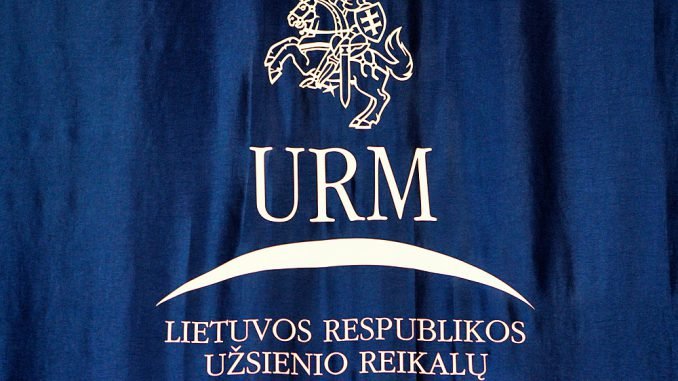
With President Gitanas Nausėda refusing to appoint former ministers, who held significant public trusts, to ambassador positions, experts note that the president has already promised some of the pledges that accompanied him into the elections and keeping the important ambassador seats vacant is deeply harmful to Lithuania, Agnė Liubertaitė and Indrė Vainalavičiūtė wrote in lrytas.lt
The president has stated that former Minister of Foreign Affairs Linas Linkevičius and former Minister of National Defence Raimundas Karoblis cannot take the most important posts in the embassies to the USA and the EU because they need “political cool down.”
Lithuanian War Academy (LKA) docent, political scientist Vytautas Isoda told the lrytas.lt news portal that both Raimundas Karoblis and Linas Linkevičius are known for their impeccable reputations and have vast public trust and so the reasons as to why the president is unwilling to see them hold the diplomatic positions can only be guessed at.

“There are many things we do not know, but Raimundas Karoblis is a man of impeccable reputation, who during his tenure as a minister had the approval of both the right and left. Linas Linkevičius also has a vast amount of experience, has worked in multiple cabinets and finally, when the Social Democratic Party experienced a schism, he joined the breakaways.
We know that the president is, in the end, of more leftist leanings and did not approve of this split so perhaps in this sense, he is not a big fan of this transition.
The two politicians held great trust. Furthermore, the current ruling bloc didn’t oppose and even wished for them to take those diplomatic positions,” the political scientist explained.
According to V. Isoda, G. Nausėda and the ruling bloc are now entering into an evident confrontation, which will influence his own ratings as well.
“I do not know whether the president is taking this into account, but it will likely not benefit his ratings because this essentially showcases that he conflict-prone and even somewhat vengeful despite running for election under completely different slogans,” the LKA political scientist said.
Lacking representatives is shameful
According to V. Isoda, blaming a single side for Lithuania lacking ambassadors in crucial representations would be unjust, but there can be no doubt that stalling this process is deeply harmful.
“After all, we know the process of how ambassadors are appointed and we know that at least for the crucial representations in the USA and EU, ambassadors have not been appointed for essentially half a year. Just a few days ago, the Ministry of Foreign Affairs itself conceded that it stalled with obtaining assent and so, could not present candidates in time to the Presidential Palace.
Thus, the process has stalled due to the fault of several institutions, which is a fairly shameful situation for Lithuania and this damage is evident,” he said.
According to V. Isoda, while it isn’t the case that Lithuania isn’t represented at the Council of the European Union, the role of an ambassador is crucial here.
“Over the past few months, there were major disputes in the EU when deliberating on questions pertaining to economic stimulus and support for countries suffering from COVID-19. In the context of these crucial negotiations, lacking a top-level representative is shameful and unseemly. Our partners make judgements of the country on this basis,” V. Isoda said.
According to him, lacking a diplomatic representative in such an important location as the USA is a display of weaker bilateral relations.
“The United States of America is our most important security partner, but if the countries have not exchanged diplomats of equivalent level, this is a lower level of diplomatic relations. In diplomatic ties, this symbolism is crucial,” the political scientist told the lrytas.lt news portal.
Mistake after another
Political communication expert Andrius Šuminas noted in regard to the president’s decision to not appoint L. Linkevičius and R. Karoblis to ambassador positions, as well as regarding the Presidential Palace’s communication in this story that, “Looking at the Presidential Palace’s communications, it’s one mistake after another… There is a constant repetition of talks or actions, which have questionable explanations. The Presidential Palace should probably first stop making those mistakes and start communicating suitably.”
He also recalled G. Nausėda’s pledges made during his presidential bid that the Presidential Palace would become open to everyone, becoming “the nation’s home.”
“Now, we see a wholly different situation. The Presidential Palace is becoming very closed off, conflict-prone and engrossed in settling accounts with those it takes a disliking to.
Probably most will remember that several well-known journalists were not invited to an event at the Presidential Palace – Vytautas Bruveris, Rimvydas Valatka and Rita Miliūtė. Afterwards, during an interview with Edmundas Jakilaitis, the president said: “Edmundas, you would be surprised if I told you that your birthday would be attended by this specific person, this specific person or this specific person,” the communications expert recalled a situation from last October and added that such a line of communication is being continued in the case of the refusal to appoint the former ministers as ambassadors.
According to A. Šuminas, the Presidential Palace’s current communication does not seem appropriate. “We do not have all that many people with such connections and such a name on the international arena. No one will have any doubt that Minister L. Linkevičius is a prominent figure with many contacts, which could prove useful. As such, these decisions raise eyebrows in surprise. Both due to the actions and due to the communication,” he said.


Be the first to comment